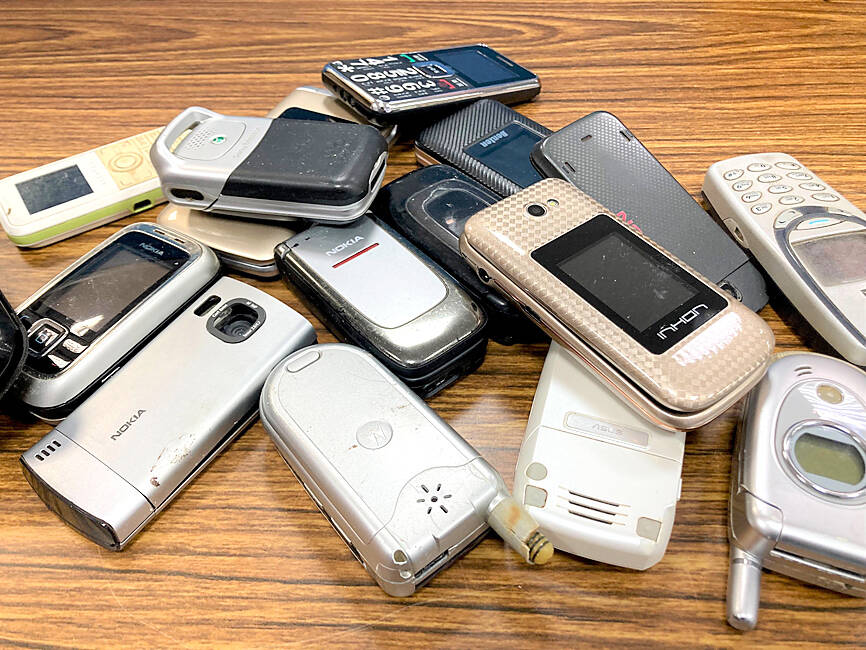Mobile phone manufacturers and importers would be required to install mobile phone recycling facilities at retail stores and to reach government-mandated recycling goals by April 1 next year, a draft of guidelines announced by the Ministry of Environment suggested.
The draft guidelines, which were announced on Thursday, state that while more than 6 million mobile phones are sold annually in Taiwan, people often keep old mobile phones in their homes after buying new ones as they store massive amounts of personal data on them.
“Considering that a mobile phone contains 70 chemical elements, including precious and rare metals, a proper channel of recycling would help facilitate the reuse of these rare resources, avoid risks to the environment and reduce carbon emissions,” the guidelines said.

Photo courtesy of the New Taipei City Environmental Protection Bureau
An estimated 220,000kWh of electricity would be conserved if 10,000 mobile phones are recycled, equivalent to a reduction of 140 tonnes of carbon emission, the ministry said.
A previous ministry survey showed that 34 percent of the respondents cited lack of incentives as the main reason that they did not want to have their mobile phones recycled, while 28 percent cited access to recycling stations as the main factor.
About 10 percent said they would have their mobile phones recycled only after they are no longer usable, while another 10 percent hope that there are services available to help delete personal data on the phones, the survey showed.
The draft guidelines require mobile phone manufacturers and importers to have stickers of the government-designed recycling sign on their products, while displaying the recycling sign in their retail stores to indicate that they comply with Resource Circulation Administration’s mobile phone recycling policy.
Mobile phone manufacturers and importers must have recycling facilities available at their retailers and they should also take precautionary measures to prevent personal data leaks as they offer incentives for consumers to recycle their phones, the guidelines suggested.
The guidelines also require manufacturers and importers to gradually increase their product recycling rate to 15 percent by 2025 and to 30 percent by 2030.
Although Taiwan’s mobile phone recycling rate reached a record-high 12 percent last year, it was still behind Japan and countries in Europe and North America, which had recycling rates higher than 15 percent in recent years, the ministry said.
Businesses contravening the guidelines would be fined NT$30,000 to NT$150,000 and ordered to rectify the situation, the guidelines said, adding that they would be fined as long as they neglect addressing the issue.
The Taipei Computer Association (台北市電腦公會) is offering a platform and integrating different channels to help mobile phone manufacturers and importers elevate recycling rates in their stores, the ministry said.
People can also have their mobile phones recycled by garbage collection services, telecom providers and convenience stores, it said.

Chinese Nationalist Party (KMT) Chairman Eric Chu (朱立倫), spokeswoman Yang Chih-yu (楊智伃) and Legislator Hsieh Lung-chieh (謝龍介) would be summoned by police for questioning for leading an illegal assembly on Thursday evening last week, Minister of the Interior Liu Shyh-fang (劉世芳) said today. The three KMT officials led an assembly outside the Taipei City Prosecutors’ Office, a restricted area where public assembly is not allowed, protesting the questioning of several KMT staff and searches of KMT headquarters and offices in a recall petition forgery case. Chu, Yang and Hsieh are all suspected of contravening the Assembly and Parade Act (集會遊行法) by holding

PRAISE: Japanese visitor Takashi Kubota said the Taiwanese temple architecture images showcased in the AI Art Gallery were the most impressive displays he saw Taiwan does not have an official pavilion at the World Expo in Osaka, Japan, because of its diplomatic predicament, but the government-backed Tech World pavilion is drawing interest with its unique recreations of works by Taiwanese artists. The pavilion features an artificial intelligence (AI)-based art gallery showcasing works of famous Taiwanese artists from the Japanese colonial period using innovative technologies. Among its main simulated displays are Eastern gouache paintings by Chen Chin (陳進), Lin Yu-shan (林玉山) and Kuo Hsueh-hu (郭雪湖), who were the three young Taiwanese painters selected for the East Asian Painting exhibition in 1927. Gouache is a water-based

Taiwan would welcome the return of Honduras as a diplomatic ally if its next president decides to make such a move, Minister of Foreign Affairs Lin Chia-lung (林佳龍) said yesterday. “Of course, we would welcome Honduras if they want to restore diplomatic ties with Taiwan after their elections,” Lin said at a meeting of the legislature’s Foreign Affairs and National Defense Committee, when asked to comment on statements made by two of the three Honduran presidential candidates during the presidential campaign in the Central American country. Taiwan is paying close attention to the region as a whole in the wake of a

OFF-TARGET: More than 30,000 participants were expected to take part in the Games next month, but only 6,550 foreign and 19,400 Taiwanese athletes have registered Taipei city councilors yesterday blasted the organizers of next month’s World Masters Games over sudden timetable and venue changes, which they said have caused thousands of participants to back out of the international sporting event, among other organizational issues. They also cited visa delays and political interference by China as reasons many foreign athletes are requesting refunds for the event, to be held from May 17 to 30. Jointly organized by the Taipei and New Taipei City governments, the games have been rocked by numerous controversies since preparations began in 2020. Taipei City Councilor Lin Yen-feng (林延鳳) said yesterday that new measures by